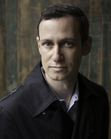The Worst Good Time
I'm a few pages from the end of Bill Buford's Among the Thugs, a study of Thatcher-era football hooliganism that doubles as a meditation on crowd dynamics. It's perhaps best known for its opening set-piece, in which the author tags along with a bunch of Manchester United supporters on a depraved trip to Turin. But for me, the heart-and-soul of the book is the chapter set in Bury St. Edmunds, where Buford attends a disco sponsored by the racist National Front. In describing the terrifying late-night scene at a pub filled with skinheads, Buford does a masterful job of illustrating how one man's idea of a crackling good time can be another man's idea of absolute Hell:
Nick Griffin indicated that the volume should be turned up further, ad the music was now brutally loud. The room was hot and filled with smoke and smelled of dope. The air had grown heavy and damp. Sixty or seventy lads were in the middle of the room, clasped together, bouncing up and down, rubbing thir hands over each other's heads and chanting in unison:
Two pints of lager and a packet of crisps.
Wogs out! White power!
Wogs out! White power!
Wogs out! White power!
They had taken off their shirt and were stripped to the waist, their suspenders dangling by their sides, knocking against their legs; sixty or seventy pale, narrow chests, covered in perspiration, pressed tightly together. They were bouncing so vigorously that they all fell over, tumbling on top of each other. I thought someone was hurt—a table had been knocked over—but they all clambered up over each other and, with difficulty, resumed their dancing. They fell over again, wet and hot. I don't know if it was the drink or the drugs or the delirium of the dancing or that chorus, over and over again, but there was a menacing feeling in the air—sexual and dangerous. The people in the crush were not in control—the business of falling over was not intended and not one was finding it funny, as people might in the spirit of drunken merriment. Some of the lads appeared to be in a trance.
I can honestly think of no party that I'd like to attend less than this National Front disco. And given how the night ends, with his skull being bashed against a lampost by one of the intoxicated lads, I'm sure Buford is in no hurry to repeat the experience. Yet massive kudos to him not only for gaining access to this secretive world, but also for approaching it not with a sneer, but with an honest desire to understand how young men might be attracted to—or perhaps cajoled into liking—this belligerent form of fun. What he ends up reporting seems absolutely genuine, untinged by his personal abhorrence for the National Front's odious politics. And yet that level-headed approach to the endeavor is what ultimately makes Buford's account all the more affecting, and all the more damning.
Next up on the reading list, now that I've had my fill of horrific anecdotes from 1980s' English soccer: The End of the Terraces.




